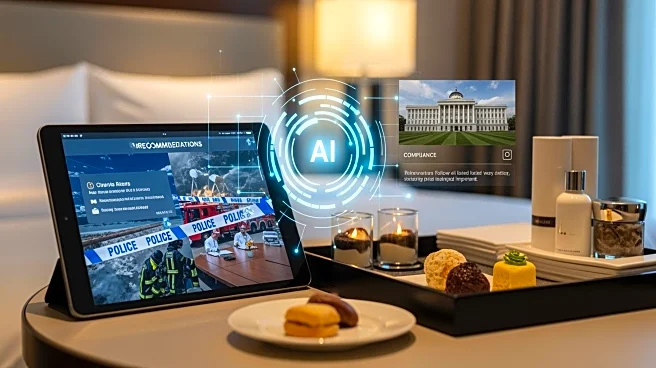What's Happening?
Scott Dahl and Mercedes Blanco have provided insights into the evolving strategies of upselling and cross-selling within the hotel industry as it approaches 2026. They emphasize a shift in traveler preferences
from mere pricing and views to more personalized and meaningful experiences. The discussion highlights the integration of artificial intelligence (AI) in enhancing guest experiences, marketing strategies, and direct booking channels. Key challenges identified include data ownership conflicts between hotels and online travel agencies (OTAs), generational and cultural differences in traveler behavior, and the need to balance personalization with privacy and regulatory compliance. AI tools, such as ChatGPT, are noted for their transformative impact on travel research and hotel distribution, urging the industry to adapt swiftly to avoid disruption.
Why It's Important?
The insights provided by Dahl and Blanco underscore the critical role of AI in the hospitality sector, particularly in enhancing customer engagement and operational efficiency. As AI continues to transform the industry, hotels that effectively integrate these technologies stand to gain a competitive edge by offering more personalized and efficient services. This shift is significant for the U.S. hospitality industry, which must navigate the complexities of data privacy and regulatory compliance while meeting evolving consumer expectations. The potential for AI to streamline operations and improve guest satisfaction could lead to increased revenue and customer loyalty, benefiting both large hotel chains and independent operators.
What's Next?
The hospitality industry is expected to continue its rapid adoption of AI technologies, with a focus on improving guest experiences and operational efficiencies. Hotels may increasingly rely on AI-driven tools for upselling and cross-selling, while also addressing privacy concerns and regulatory requirements. Industry stakeholders, including hotel groups and technology providers, are likely to explore partnerships and collaborations to leverage AI's full potential. As AI becomes more integrated into hotel operations, the industry will need to ensure that technological advancements do not overshadow the human touch that is essential to hospitality.
Beyond the Headlines
The integration of AI in the hospitality industry raises important ethical and cultural considerations. As hotels adopt AI-driven personalization, they must navigate the fine line between enhancing guest experiences and infringing on privacy. The industry's ability to balance these concerns will be crucial in maintaining consumer trust. Additionally, the cultural shift towards AI-driven interactions may alter traditional hospitality roles, requiring a reevaluation of workforce skills and training. The long-term impact of AI on the hospitality industry could lead to a redefinition of service standards and guest expectations.










